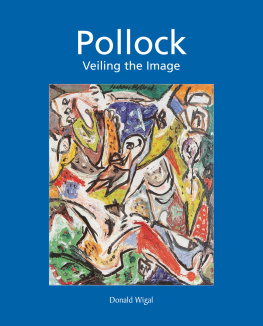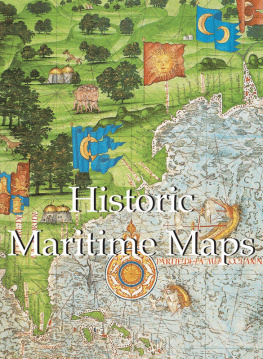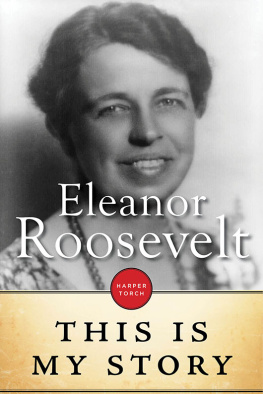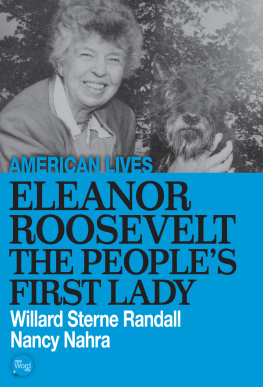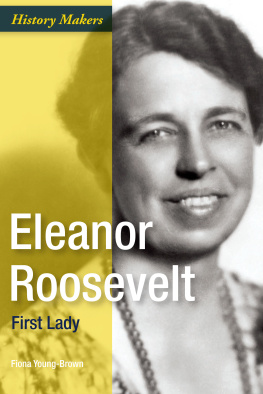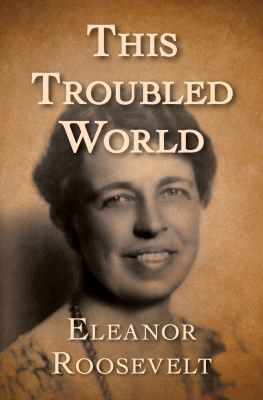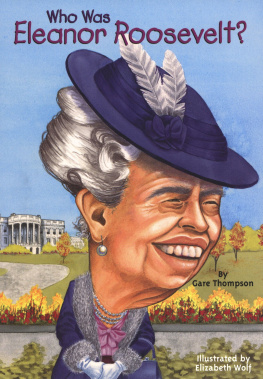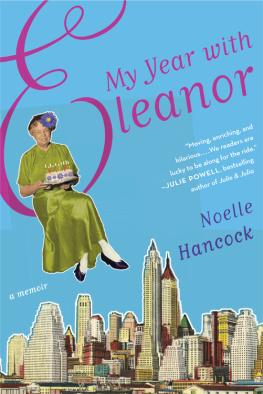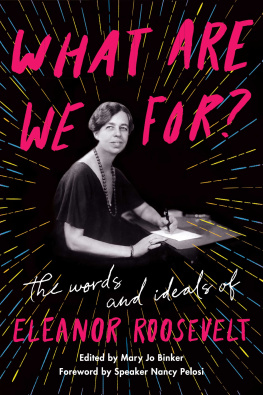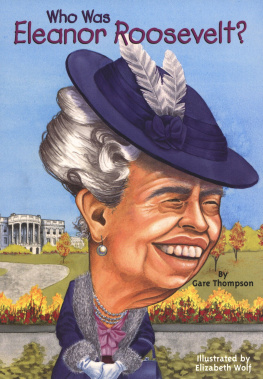Few people in history have reacted to their times and at the same time influenced them more than did Anna Eleanor Roosevelt (18841962). Not only did she live during the most turbulent years of the twentieth century, but she also was often uniquely at the very pulse-taking points of its events.
Mrs. Roosevelt, heroine and humanitarian, advocate and activist, prolific writer and leader, is justly considered one of the most influential women of the twentieth century. She was chosen the most admired American by a Gallup poll in 1958. No future reckoning or reassessment of history is likely to remove that remarkable distinction from her. However, interestingly, she is not one of the most frequently quoted people of her century, in spite of her hundreds of newspaper columns and articles, four autobiographical volumes, several other published books, many speeches and interviews, and volumes of letters.
There might be as many famous quotations about Mrs. Roosevelt as there are quotations by her. The most famous might be Harry S. Trumans dedication of her as First Lady of the World. Her friend, Adlai Stevenson, stated: Certainly one of Gods noblest, strongest creations was Eleanor Roosevelt. Another friend, the novelist Martha Gellhorn, states that there has been no other woman of her stature in pubic life and probably there never will be again. She was also named Woman of the Century by the National Womens Hall of Fame. Psychologist Howard Gardner noted that both she and Martin Luther King Jr. were leaders of non-dominant groups... leaders of the dispossessed. In her Leadership the Eleanor Roosevelt Way, Robin Gerber adds that Eleanor led by breaking down isolation, by bringing communities together and forging ties across racial and class lines.
When she was first lady of New York State and later first lady of the United States, there were several other leaders with even greater platforms. Her own husband, of course, was most notable among the giants with whom she often shared ideas. This was at a time when few women had spoken out about anything, let alone on key issues of their day. In the 1950s she represented her country in travels to England, France, India, Japan, and the Soviet Union. The queen of England, Winston Churchill, Gandhi, and other giants of history shared with her more than merely social conversations. She gave to them of her wisdom, and passed on to us theirs as well. She was indeed an admirable reservoir as well as an exceptionally effective channel of information, knowledge, opinion, advice, wit, and inspiration.
Mrs. Roosevelt
During her lifetime, even those close to the first lady referred to her as Mrs. Roosevelt, rarely as Eleanor. We here respect that practice even at the risk of being repetitious. We feel it is a small price to pay for using each opportunity we have to show respect for our distinguished subject.
Quotations
This book presents nearly five hundred excerpts from her works, indexed by many major concepts and key words. There are only a few quotations from Mrs. Roosevelts many writings found in the most popular collections of quotations. For instance, there are only two in John Bartletts Familiar Quotations (16th Edition). Some collections in fact do not quote her at all, but all of the more famous quotes are included here. A fine compendium of quotations edited by Alex Ayres titled The Wit and Wisdom of Eleanor Roosevelt (Meridian, 1996) demonstrates that one need not call on many of the available resources to find a surplus of brilliant passages from Mrs. Roosevelt. But, Ayress book is not focused on our theme of wisdom.
The quotations are presented in general chronological order by year, with highlights of Mrs. Roosevelts life and current events. Events mentioned within a given year might not be in strict chronology.
Letters
Unlike most previous collections of excerpts from the writings of Mrs. Roosevelt, this one includes numerous quotations from her published personal letters. Specifically, included are passages from her letters to her daughter, Anna (as quoted also in Mother and Daughter, by Bernard Asbell), and to her husbands successor in the White House, Harry S. Truman, as quoted also in Eleanor and Harry, by Steve Neal. Also included are excerpts from her letter to her friend David Gurewitsch as quoted also in his widow Edna P. Gurewitschs Kindred Souls. Finally, there are excerpts from letters to her friend Lorena Hickok as quoted in Empty Without You, by Rodger Streitmatter.
Of her intimate letters, we have not included those excerpts, typically taken out of context, that seem to be of interest only to the merely curious or to only superficial journalism. Rather, we have sought out the pearls of wisdom that can travel beyond personal feelings to more universal applications or understandings.
Mrs. Roosevelt stressed to President Truman that she would not use a private letter in a public way at any time (May 5, 1945, Eleanor and Harry). We respectfully propose that our intention here is to share her wisdom with the world, not invade privacy in any way.
Writing Style
As Mrs. Roosevelt admitted to President Truman, her handwriting was anything but legible (May 5, 1945, Eleanor and Harry). That might account for some of the difficulties in transcribing the letters. But it is her style that might distract the reader even after transcription.
Readers of the letters of Mrs. Roosevelt often mention that her informal writing style presents problems. Among the distinctive habits of the writer is her frequent use of the ampersand (&), especially between sentences, creating run-on sentences. The sentences of an entire letter might all be linked with ampersands. Rather than be distracting, these linked sentences can remind the reader of the very active mind behind even the most casual of comments. While probably not to be advocated in writing courses, her style reminds us that she was continually making associations between one idea and another, even when the two seem to us at first unrelated.
The editors temptation is to correct the writing style. However, we have here been faithful to the published editions of these letters, with a minimum of editing where the slips are obvious (e.g., changing effect for affect, insure for ensure). Nearly all of the letters quoted here are informal, and were obviously never intended to be published.
Time Capsules
Many excerpts from the writings of Eleanor Roosevelt stand on their own without knowing more specifically where or when they were said. However, knowing to whom Mrs. Roosevelt is speaking often helps the reader appreciate passages from letters, for example. In fact, when seen in the context of their times and places, many of her comments can be more appreciated. Her statement, for instance, that Mr. (Richard M.) Nixon never has anything but hindsight, can be appreciated more fully when we see that she said that in 1960, before John F. Kennedy defeated Nixon to win the presidency later that year.



